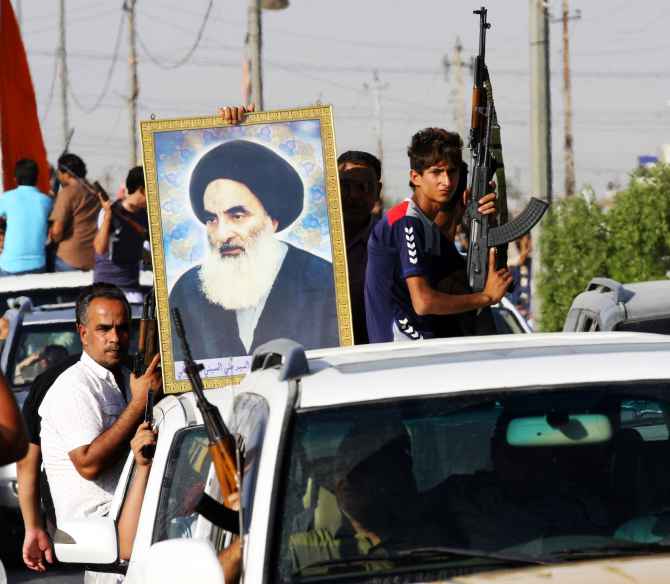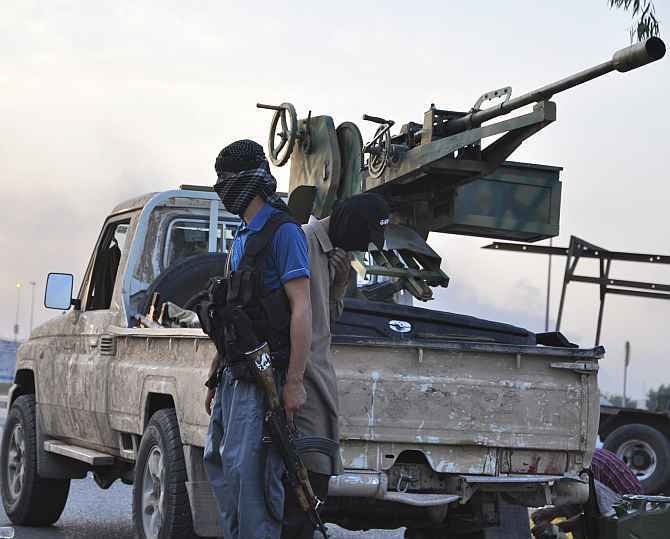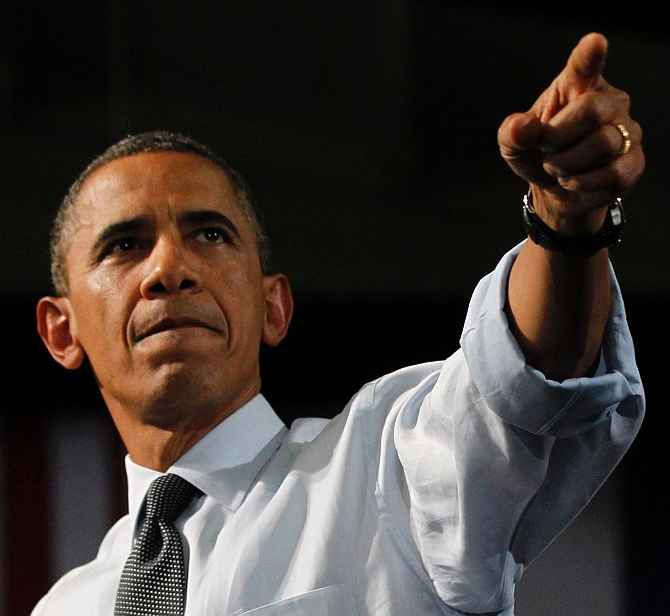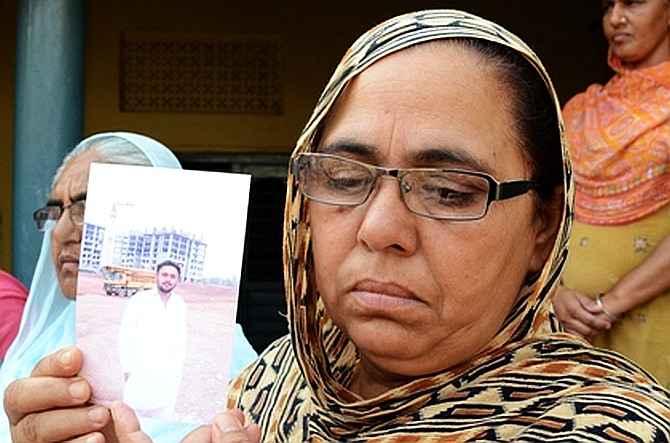 | « Back to article | Print this article |
'Americans created the sharp sectarian divide in Iraq'
‘I personally feel it was a very conscious decision on the part of the Americans to rekindle the Shia-Sunni tensions in the region. It was one of their main aims. The Americans have succeeded beyond their expectations in Iraq. What we are seeing now is a culmination of what the US started in 2003.’
‘The issue of 40 Indians who have been kidnapped in Mosul, will not be easy to handle. Our problem is that in Afghanistan and Pakistan, the Taliban will draw a lot of inspiration from these guys. Some of the jihadis who have tasted success there will come here, to our part of the world, particularly Pakistan.’
Ambassador Chinmaya Gharekhan explains the situation in Iraq and Syria in this interview to Rediff.com’s Sheela Bhatt.
This is the first of a two-part interview.
 Chinmaya Gharekhan, retired diplomat, in his distinguished career has served in Egypt, Congo, Laos, Vietnam, and former Yugoslavia. He has spent nearly a quarter century dealing with the United Nations in various capacities. He earned a name for his diplomacy as India's Permanent Representative to the United Nations in New York from 1977-1980.
Chinmaya Gharekhan, retired diplomat, in his distinguished career has served in Egypt, Congo, Laos, Vietnam, and former Yugoslavia. He has spent nearly a quarter century dealing with the United Nations in various capacities. He earned a name for his diplomacy as India's Permanent Representative to the United Nations in New York from 1977-1980.
He also served as advisor for foreign affairs to prime ministers Indira Gandhi and Rajiv Gandhi between 1981 and 1986. As India’s ambassador to the UN from 1986-1992 he represented India in the Security Council where he served twice as president.
He has a unique experience and understanding of middle-eastern issues. He lived in Gaza city for two and a half years from 1997 as UN Special Coordinator for Occupied Territories. He served as Special Envoy of India for West Asia from 2005 to 2009. At present, he is president of the Indira Gandhi National Centre for the Arts, New Delhi. (The Narendra Modi government may ask him to resign as he was appointed by the United Progressive Alliance regime).
Gharekhan is the author of the book The Horseshoe Table: An inside view of the UN Security Council.
In an exclusive interview to Rediff.com’s Sheela Bhatt, ambassador Gharekhan speaks eloquently about the complete mess in Iraq which, he claims, is a direct culmination of the US invasion of the country in 2003.
His words of wisdom will be difficult to ignore for the new rulers in New Delhi who are trying to grapple with the kidnapping of 40 Indians in Mosul, Iraq’s second largest city.
Please click NEXT to read the interview…
'A very conscious decision on the part of Americans to rekindle Shia-Sunni tensions'
Can you explain the background to the Islamic State of Iraq and Syria who have captured Mosul and Tikrit? What exactly does it mean and how did it happen?
Well, the whole thing started in 2003, when the US intervened in Iraq. After the 9/11 atacks, Afghanistan was the immediate target. They wanted to destroy the Al Qaeda and so on. But instead of focusing all their resources on Tora Bora in Afghanistan to search for Osama bin Laden and getting rid of him, the Americans diverted to Iraq because it was always the intention of the US to get rid of Saddam Hussein.
So, in 2003, America intervened with British help, on false premises, on grounds which they knew were false. They knew there were no weapons of mass destruction in Iraq and there was no links between Saddam and the Al Qaeda. But, anyway, they intervened because of Israeli and neo-con pressure. And then they got rid of Saddam and they made a series of mistakes.
They disbanded the Iraqi army, they disbanded the civil administration in Iraq. They got rid of all the Ba’athists having loyalty to Saddam, and anyone who was suspected to have Ba’athist connections in the previous regime was not acceptable in the new administration.
Paul Bremer, who was kind of a viceroy, made many mistakes. He was the presidential envoy to Iraq. The Americans destroyed all institutions and produced a constitution for Iraq. The constitution was made in Washington and then ratified in Baghdad. And then they decided that the Shias will have this office, Sunnis will have that office and Kurds will have this office.
On the lines of Lebanon, the Americans institutionalised the sectarian divide in the country. Iraq never had sectarian divide so sharp as the Americans have now brought in. One can keep on debating whether they wanted to create the Shia-Sunni divide or they played on the differences between the two sects.
I personally feel it was a very conscious decision on the part of the Americans to rekindle the Shia-Sunni tensions in the region. It was one of their main aims. The Americans have succeeded beyond their expectations in Iraq. What we are seeing now is a culmination of what the US started in 2003.
And, in Syria…
The Syrian uprising perhaps started as a genuine popular movement on a very small scale. It is possible that the regime of Bashar al-Assad dealt with that initial spark in a very ruthless manner. Maybe I think they overreacted, very harsh treatment was meted out to the rebels, to the protestors, but very soon external elements took advantage of the situation and again the sectarian elements came into play immediately.
All the neighbouring countries jumped in. Turkey, which is a Sunni state, Qatar, Saudi Arabia, UAE, they all jumped in to get rid of Assad, who technically belongs to the Shia minority community called Alawi. The pure Shia mullahs do not accept Alawi as part of the Shia movement. But there was a deal between Iran and Bashar al-Assad. This is one of the factors that explains the close links between Teheran and Damascus because Teheran granted recognition to this Alawi sect.
So President Assad is greatly beholden to Teheran. That’s why Iran is supporting the Syrian regime to the hilt. And they will do anything and everything that it would take to save the Assad regime in Damascus. So Syria also is witnessing this sectarian strife. To cut the story short, the foreign elements that went into Syria to take advantage of the situation, many of them, now we know are from extremist Sunni factions.
Please click NEXT to read further…
'The US is never too concerned about the world'
Who are their supporters?
They are supported by Turkey, Qatar, Saudi Arabia. Of course there’s UAE and others but these are the three main players. Because of them the radical elements gathered momentum in Syria. The Syrian war also became the Shia-Sunni war and in the process the Americans ostensibly got a bit disturbed, lately, that the radical elements were coming to the fore in the anti-Assad movement.
So Assad took advantage of this because he realised that the American public, the Western, the European public opinion is very scared of the fundamentalist Islamist elements and worried that they may come to power in Damascus.
And let us not forget that many of the jihadis in Syria are from western Europe, there are some from America but several hundreds if not thousands of jihadis are from western Europe.
Educated over there…
Not only educated in western Europe. They are western European citizens and they are fighting in Syria now as jihadists. If and when this Syrian civil war comes to an end, these jihadists of western European origin will go back to their countries and play havoc there. So England, France, Germany, Belgium and the Netherlands are all very scared about their jihadis who are now fighting in Syria and will then go back.
So there’s a lot of pressure from the Saudis and the Qataris to intervene in Syria -- not to send their armies but to support the rebels, the fighters, the anti-Assad elements.
When Bremer did what he did, what was his idea? What did America expect out of their original strategy? What was their ‘dream situation’?
If you want to give him the benefit of the doubt, then you can say he was foolish. But if you don’t want to give him the benefit of the doubt, then one can speculate that Bremer did all this to precisely bring about the situation that is happening now.
But, it doesn’t help America. It doesn’t help the world.
The Americans don’t worry about the world. The US is never too concerned about the world.
They want to preserve their lifestyle. Their people should continue to enjoy the highest living standards possible. So they are not very concerned about the rest of the world. They are worried about the western European world because they are of the same religion, ethnically and racially they are the same, they are the same people. Maybe I’m being a little bit too harsh but I don’t think Americans are much concerned about the rest of the world.
I understand, but how does the current situation in the Syria and Iraq help America?
You know this element called 'born-again Christians' in the southern Baptist-dominated states of the US? Their agenda is that Christ must come again. Jesus will come. I don’t know if you have been to Jerusalem. In the old city of Jerusalem, you go on the table top, the mountain where the Al Aqsa mosque is located. The Jews claim that their temple was there. There is a gate there which is closed. That one gate is closed to the complex and they believe that the saviour will come from that gate. They genuinely believe that.
Some of them do believe, I think, the lesser the number of Muslims in the world, the better for the world. There are many people who don’t worry if the Muslims are divided within themselves.
Please click NEXT to read further…
'Obama's priority is to finish his term in office without any American boots on the ground in the Middle-East'
How do you read US President Barack Obama’s recent statements on Iraq? Will Americans have ‘boots on the ground’ in Iraq again? What are Obama’s options?
Obama’s priority is to finish his term in office without any American boots on the ground in the Middle-East. He has two years or so to go and the last six months don’t count. So, he wants to extricate America from the Middle-East by the end of his second term and the American public will not accept another war in which America is involved bilaterally.
And he knows the mood of his people. He is a politician like our Mr Modi, who knows the mood of people well. So, while the rest of the world and some elements in his own country criticise him, that he is weak and so on, but, by and large the American public is happy that Obama is not getting the country involved again in yet another war in the Middle-East. This is my own assessment of the American mood, also.
Some of his statements do talk about a few options on the table…
Yeah. You know, after all he’s the president of the USA. He has to make some tough statements. But he’s a pragmatic person. He’s not a fanatic or a neo-con.
Surely, this must be the assessment, also, of some experts in the battle zone.
Yes, they know that and, more importantly, people of countries like Saudi Arabia, were extremely unhappy with Obama and with the US, with American foreign policy. The Saudis and Kuwaitis are very unhappy and they say that we don’t trust America or Obama anymore because they think he let them down in Syria.
Remember that chemical weapons were used in Syria. It is now quite well established that those chemical weapons were not used by the regime there, they were used by the opposition and this is why Obama did not strike against Syria. So it’s quite clear that Saudis are very upset. The Saudis are afraid when the Hosni Mubarak regime fell in Egypt and all that followed.
What will be the final consequences of Obama’s restraint at this point of time?
Obama will have to exercise restraint. What does one expect of Obama when he’s not going to send troops there? Though on Wednesday they announced that they’re sending 200 soldiers to protect their embassy, but this will be the beginning of going down the slippery slope because if 200 are not enough then you send 250 more and so on. I don’t think they will make the mistake again.
Please click NEXT to read further…
'The issue of 40 abducted Indians will not be easy to handle'
Another facet of the current development is this whole issue of Iran’s stand. Is there any convergence of interest between Iran and America in the current crisis?
Well, there appears to be superficially some interest but fundamentally no. Because, America has done everything in the Middle-East for the last 10 years to help Iran! Everything that the US has done has helped Iran.
By default?
Yes, by default. It wasn’t their plan or intention. But the net result is that Iran is now a very big player in the region. It’s the most important player in the West Asian region. Iran is very much interested in saving the regime in Iraq. Prime Minister Nouri al-Maliki is Teheran’s man in Baghdad. There’s a Shia regime in power so Iran does not want to lose that position of influence.
But America’s apparent interest, ostensible interest, is that this strong fundamentalist regime of the ISIS should not take power in Baghdad. Because that might pose a threat to neighbouring countries, which it will. It will create problems in Jordan which is very fragile, very unstable. Jordan will be under a big threat, Lebanon too is fragile.
One thing we should keep in mind today. Syria and Iraq are one theatre of war. You should not treat them as two separate countries. They are one in eyes of the ISIS. There is a constant to and fro movement. You see, the Shia government in Teheran is supporting the government of Damascus. The Sunnis of Iraq are supporting the Sunnis of Syria.
And the Saudis, who are of course Sunnis, are supporting Sunnis of both Iraq and Syria. So, that is why we have heard Maliki accusing Saudi Arabia of fomenting genocide in Iraq. I think the Shia-Sunni tensions are maybe worse than what they were when the famous battle of Karbala took place, where Prophet Mohammed's grandson Iman Hussein and his infant son were killed in the battle. And that is where historically the Shia-Sunni conflict started.
Today it will not be much of an exaggeration to say that Iraq is in a worst situation than ever before. We in India have to be very watchful because, for our own reasons, we don’t want these fanatics of the ISIS to win, it’s a fundamentalist terrorist group.
They’re so fanatic and violent that even the Al Qaeda doesn’t recognise them as its part. They’re beyond the Al Qaeda. So these people are going to be a big menace. It's Iraq’s issue if they remain one country or not. Maybe this is too much to say, but it is their country. If the Sunnis, Shias and Kurdish communities of Iraq cannot live together in peace and harmony, then the consequences will follow.
And Maliki has done nothing to preserve the unity of the country. He has been persecuting the Sunni community there. These fellows who have come from Syria, the ISIL, the Islamic State of Iraq and Levant, it’s called either I-S-I-L or I-S-I-S but ISIL is the proper term for these people.
These ISIL people who are extremely rabid have found support among the local Sunnis in Iraq, so things have gone out of hand. The ISIL got its original inspiration from the Al Qaeda. Now, it is led by a terrorist called Abu Bakr al-Baghdadi.
The issue of 40 Indians, who have been kidnapped in Mosul, will not be easy to handle. Our problem is that in Afghanistan and Pakistan, the Taliban will draw a lot of inspiration from these guys. Some of the jihadis who have tasted success there will come here, to our part of the world, particularly Pakistan.
Watch out for Part 2 tomorrow




